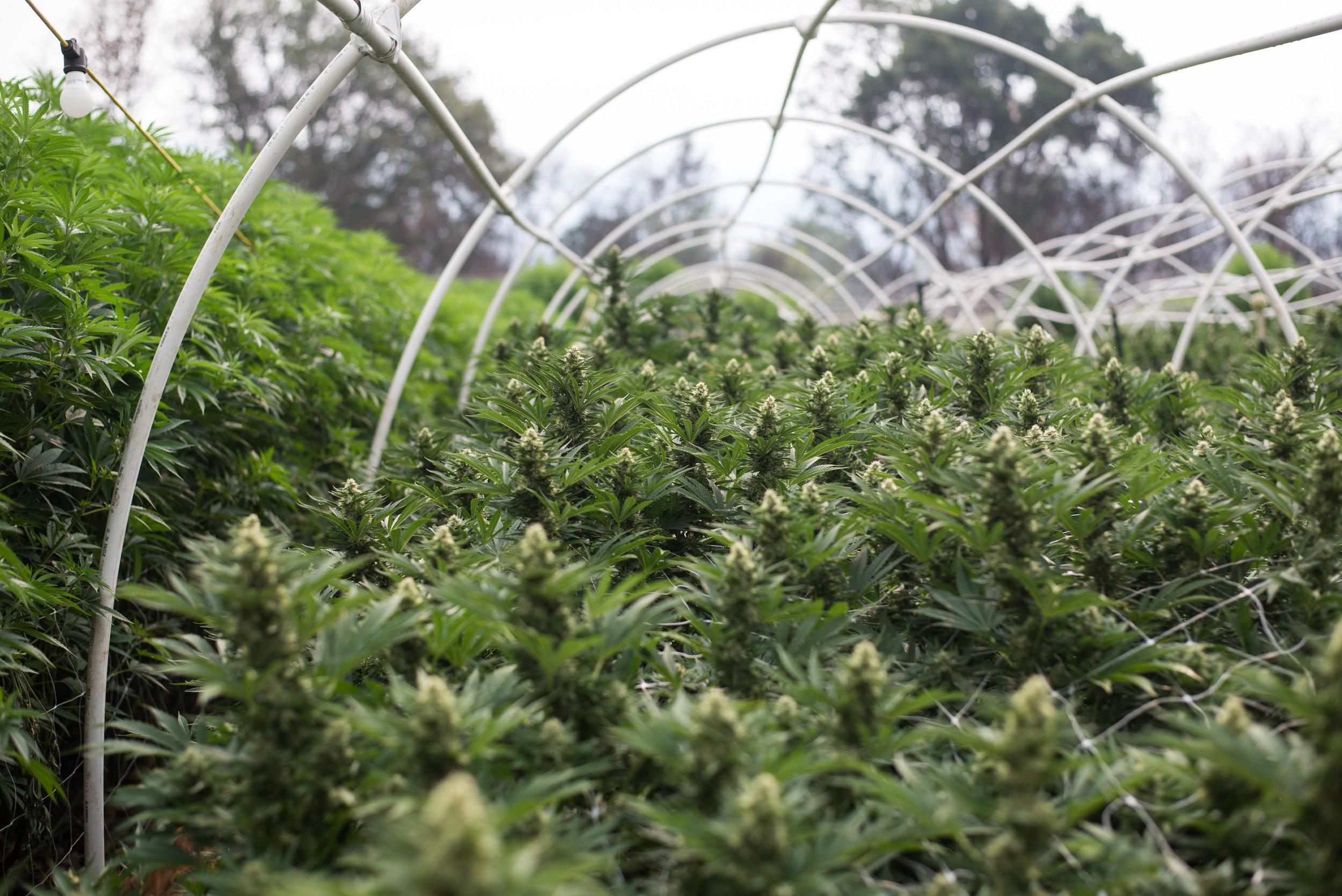
This summer, Emerald is on a mission to learn more about Sun+Earth Certified cannabis. Each week we’ll be interviewing certified growers and manufacturers across the U.S.

On the banks of the Russian River, nestled in the hills of the Redwood Valley, stands a 1930s farmhouse with gaping windows surrounded by rolling acres of cannabis plants. Welcome to the Tall Tree Society; home to Shane Gary, Carson Eggerding, and their merry band of workers, family and friends.
The Tall Tree Society is a long time dream. Shane and Carson grew up together stomping around the woods of Michigan, playing in the dirt and messing around in their gardens. A few years ago, they decided that it was finally time to make their dream a reality and founded the Tall Tree Society in Mendocino County, CA.
Join us as we glimpse further into the hectic and eco-conscious world of these two farmers.
EMERALD: What makes Tall Tree Society “special?”
SHANE: We grow in the ground and aim to leave the land better off than we found it. We’re trying to create a community that has each other’s backs and that’s a positive part of the cannabis system. We want to form a farm that does more good than harm, which is kind of hard to do with a lot of the farms in the industry.
EMERALD: Can you tell us some more about the major operations in the industry? How are they different from “mom and pop” style operations? From yours?
CARSON: The amount of energy it takes to run a commercial indoor operation is absolutely staggering. A lot of those systems are drained to waste as well so all these salt-based nutrients and chemicals that they use are going right into the water system. That contributes to algae blooms or high nitrogen in your waterways… It’s not good for the fish, it’s not good for the people and it’s not cannabis you want to consume in any way. We want to show people that we’re farmers that care about the land and that care about the consumer.
EMERALD: Tell us about your growing process and techniques.
SHANE: First of all, we’re trying to source all of our stuff as local as possible. One of the biggest things when it comes to our carbon footprint is the production of some of the random stuff that we use. A lot of this stuff we try to grow locally right here: our goat poop for phosphorus, our chicken manure for nitrogen, our worm bins for microbial inoculants or our green compost gardens. We try to stay away from that mono-crop culture and grow lots of different things in our beds with our cannabis, such as pollinator flowers, nitrogen fixing vegetables like yams, or beneficial insect plants like dill, coriander and calendula.
CARSON: We don’t want it to be too sterile.
EMERALD: Being in Northern California, what has your experience with wildfires been over the last few years?
SHANE: They were right in our backyard the last few years.
CARSON: The Mendo Complex Fire, the largest one in California history, was five miles from us. We watched that burn for almost two months. It’s terrifying… We’re lucky. Pretty much everything up north of us on the valley floor got wiped out. It’s very real.
EMERALD: Speaking of terrifying… How has COVID-19 impacted you?
SHANE: We’ve lost a handful of employees that worked full-time. We have some friends visiting as well who are able to pitch in and help us out. We installed hand washing stations around the farm. We try to advocate social distancing and send out the standard emails and texts to everybody — just to be safe.
CARSON: Right now, everybody that’s working here is staying here, so that helps. The people that we did lose; we didn’t necessarily let them go, but they have kids and since school’s closed, that does make it extremely difficult to come to work. We totally understand that and we want to support them the best we can.
SHANE: Now we just give them all of our free vegetables.
CARSON: It’s honestly nice being an essential business. My day-to-day hasn’t really changed. I just don’t leave the farm.
EMERALD: We’ve got to know. What’s your most popular strain? What’s your favorite strain?
SHANE: For the past few years, Banana Split has been selling really fast. It grows really well with our cultivation techniques.
CARSON: I really like how this Pai Gow is turning out right now. It’s a Super Silver Haze and a Critical Jack cross. It’s a crazy early finishing sativa. We’re gonna do a lot of our own strains coming up in the next year or two. That’s the goal. You want to have your own proprietary genetics.
The Tall Tree society is an ambitious part of the movement to change how we perceive the cannabis growing industry. They believe in sun-grown, environmentally conscious and organic cannabis. In Shane’s words, “buy organic and learn where your weed comes from.”
Images:
“We certify cannabis that is grown under the sun, in the soil of Mother Earth, without chemicals by fairly paid farmers.” – Sun+Earth



To properly grow cannabis you must grow under sun without animal farm byproducts like bone meal or feather meal. You keep the males pollinate the females and you save seed which improves the plants every year. Than you grow until senescence (the plants are completely done) than dry under sunlight sieve the glands and press and heat them repeatedly over fire into hash which can than be eaten. You are after cbn not thc which is why good hash tests low in thc. Good hash makes you sleepy CBN not anxious THC.